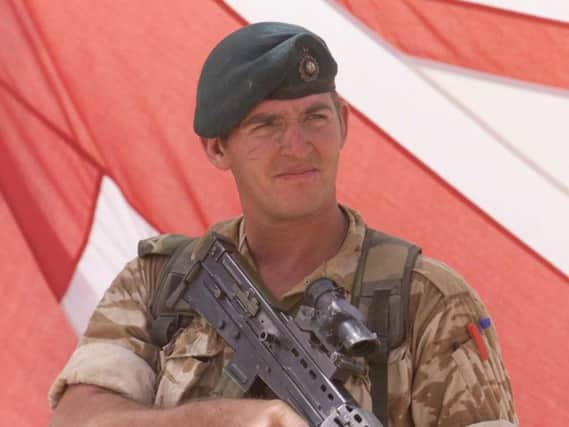Wife 'overjoyed' as Marine Alexander Blackman likely to be home within weeks


Claire Blackman said she was "overjoyed" after judges sentenced her husband to seven years for diminished responsibility manslaughter - meaning that because of time already served he could be freed next month.
Surrounded by scores of veterans outside the Court Martial Appeal Court in London, she said: "We are overjoyed at the judges' decision to significantly reduce Al's sentence, such that he can be released imminently.
Advertisement
Hide AdAdvertisement
Hide Ad"This is the moment that we have all been fighting hard for. It is hard to believe that this day is finally here."
A panel of five judges, headed by Lord Chief Justice Lord Thomas, sentenced Blackman, 42, from Taunton in Somerset, to the term of seven years following the recent quashing of his murder conviction for the 2011 killing.
Announcing the decision, Lord Thomas said: "As with any person sentenced to a determinate term, his release will ordinarily be at the halfway point of the sentence."
Blackman, who watched Tuesday's proceedings via video link, has already spent almost three-and-a-half years in prison following his original conviction in November 2013 after the death of the insurgent.
Advertisement
Hide AdAdvertisement
Hide AdOne of Blackman's legal team indicated he would probably be released in about two weeks, but the decision on the exact date was for the Prison Service to determine.
The Court Martial Appeal Court ruled previously that Blackman was suffering from an "abnormality of mental functioning" at the time of the 2011 killing when he was serving with Plymouth-based 42 Commando.
The court found the incident was not a "cold-blooded execution" as a court martial had earlier concluded, but the result of a mental illness, an "adjustment disorder".
The judges said Blackman had been "an exemplary soldier before his deployment to Afghanistan in March 2011", but had "suffered from quite exceptional stressors" during that deployment.
Advertisement
Hide AdAdvertisement
Hide AdThey found his ability to "form a rational judgment" was "substantially impaired".
Blackman shot the insurgent, who had been seriously injured in an attack by an Apache helicopter, in the chest at close range with a 9mm pistol before quoting a phrase from Shakespeare as the man convulsed and died in front of him.
The judges said in their sentencing remarks that "this was a deliberate killing of a wounded man".
Although Blackman's responsibility was diminished, he "still retained a substantial responsibility for the deliberate killing".
Advertisement
Hide AdAdvertisement
Hide AdThey listed a number of "aggravating" factors, including "the effect of the appellant's actions on the reputation and safety of HM Armed Forces".
They said: "There can be no doubt that the way in which the appellant acted, knowingly in contravention of the Geneva Conventions, in deliberately killing by shooting an injured insurgent in the circumstances recorded on the video clips ... has had a material adverse effect on the views many hold about the conduct of HM Armed Forces.
"The appellant's actions can be used by the insurgency and others as evidence that the killing of the insurgent was in breach of the values proclaimed for which the International Security Force and HM Armed Forces had been sent to Afghanistan."
Turning to the mitigating factors, these included "the appellant's outstanding service record, together with the very impressive statements that have been placed before us attesting to acts of conspicuous bravery".